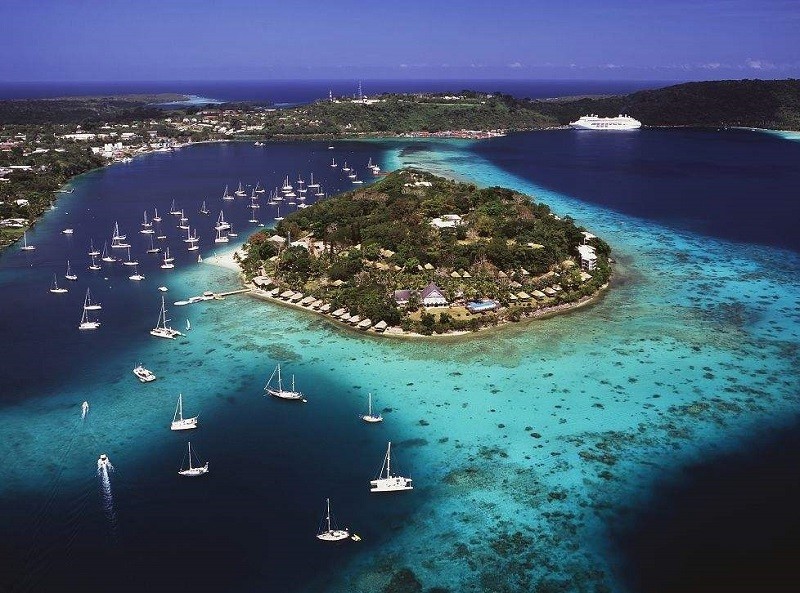The Solomon Islands is a country that most people don't know about. It's not even as famous as the historical King Solomon. In 1568, Spanish colonists discovered it and named it the Solomon Islands. In other words, the name of the country is "rewarded" by foreigners.
However, the country has recently become more famous because it cannot go together with the United States and Australia, and it is criticized by the two of them, and even the threat of force. The main reason why this small country can get such "treatment" is that the United States and Australia cannot get out of the strange circle of their hegemonic thinking.

The geographical location of the Solomon Islands is very important, and during World War II, the United States fought a famous island battle here, the Battle of Guadalcanal. Friends who have watched the American drama "Pacific War" may vaguely remember that the AMERICAN Marine Division, as the protagonist of the film, was very impressed by this battle, and even did not hesitate to take out a few episodes to tell the story here.
Why did the United States have to launch the Guadalcanal Campaign? Because the Solomon Islands can be called the gateway to Oceania, it is the only way for Australia to connect to the United States. If the battle is not won, then Japan is very likely to cut off Australia's sea communication with the United States and then attack Australia.
This shows the strategic importance of the Solomon Islands. But such an important place has become a mustard in the eyes of the United States. After the end of World War II, the United States left a large amount of ammunition, hazardous chemical waste and various military hardware here, but did not leave a memory.
Campbell, the Indo-Pacific Commissioner of the National Security Council of the United States, also admitted that the South Pacific island countries have not seen the US ambassador for decades. Fiji, for example, has not been visited by the U.S. ambassador for 37 years, and the U.S. embassy in the Solomon Islands has been closed for 29 years. But why is this suddenly the focus of the world?
The reason for this is that the United States sees these island nations in the South Pacific as its own sphere of influence, and even if it does not operate, it will not worry about what they think of other things. To put it bluntly, it is disrespectful. In the eyes of the American hierarchy, they are not a country at all.
In 1949, for example, MacArthur declared that the island nations of the South Pacific had become "America's Lake," meaning U.S. territory. But why don't they run this "territory"? That's because as long as the shipping lanes with Australia are not blocked, whether these island nations are dead or alive means nothing to the United States.
However, for the major countries in Oceania, Australia still attaches more importance to them. In 1951, Australia publicly declared that the South Pacific island nation was its moat. Recently, Australian Prime Minister Morrison directly declared: This is our small land.
That is to say, in the eyes of Australians, these South Pacific island countries represented by the Solomon Islands are an extension of their conventional territory. To put it bluntly, it is the colony of Australia. In the 21st century, the western countries that pursue freedom and democracy still hold this argument, and its starting point is frightening.
Since it is an extension of the territory, these island nations must listen to their own words. It is not difficult to understand why the United States and Australia have publicly imposed diplomatic coercion on such a small island as the Solomon Islands, and even threatened to resort to force, and their core idea is to maintain their regional hegemony.
Unfortunately, these South Pacific island nations are not at the mercy of children. As independent sovereign states, they have their own normal political demands. They are not anyone's lake, nor are they anyone's moat. Unlike the political, economic, military, and even Russian and Ukrainian topics that the great powers care about, these South Pacific island countries are most concerned about global climate issues.
After all, the earth's environment continues to deteriorate, which is manifested in the increase in greenhouse gases and the rise in sea levels. Tuvalu, one of the South Pacific island nations, will be the first country in Earth's history to be flooded by seawater. Rather than a war between Russia and Ukraine, rising sea levels are the big problem that threatens the survival of the island nation.
But the United States and Australia have refused to cut carbon dioxide emissions for their own development. This is not a manifestation of what a responsible major country should have. Not to mention that they also regard these island nations as their "territory". This is also the main reason for the rise of independence and autonomy of these island countries, which used to be called by others with their eyes closed. Now it is a matter of life and death, they do not care about themselves at all, then they only have the right to seek a survival for themselves.